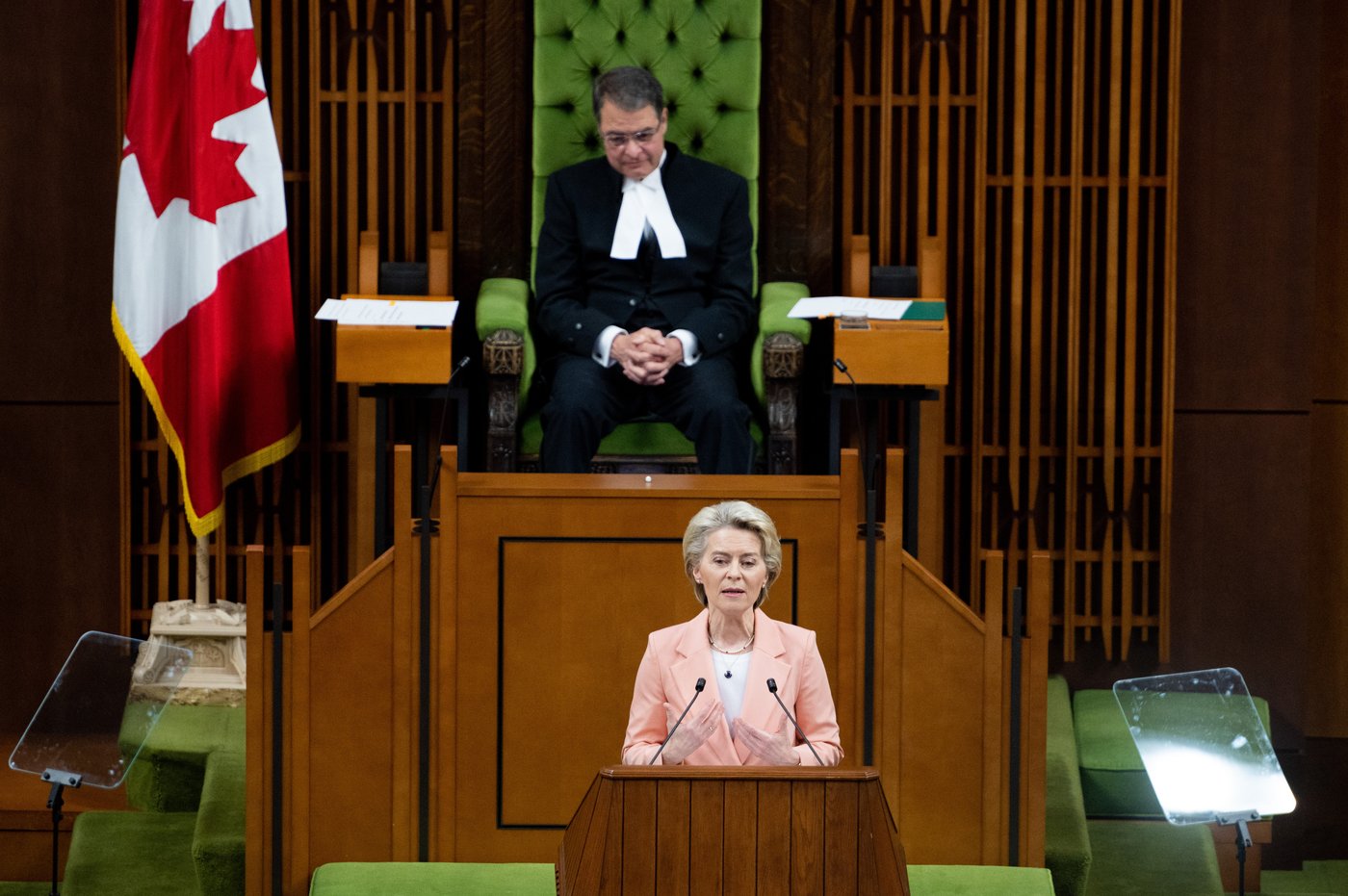Prime Minister Justin Trudeau announced more support for Ukraine and a new hydrogen agreement with Europe on Tuesday alongside European Commission President Ursula von der Leyen.
Canada will extend the Operation Unifier mission to provide engineering training in Ukraine until at least October, and Canadian medical trainers will be sent to help Ukrainian forces with combat medical skills.
“Canada is doing much more than its fair share already compared to others and is going way beyond what is necessary. So I want to thank Canada for that,” von der Leyen said at a joint press conference with Trudeau in Kingston, Ont.
She added that the military training operation that Canada initiated in Ukraine in 2015 had an effect on the early successes of “much better trained” Ukrainian troops after the Russian invasion began in February 2022.
Trudeau announced that Ottawa will spend $3 million to support the clearing of landmines and unexploded ordnance in Ukraine, on top of $32 million that was already committed toward mine action. The European Union is putting 43 million euros toward the same effort.
The EU has now designated Canada as a partner country on economic sanctions against Russia, and the two are working together to send Canadian energy transformers to support the Ukrainian electrical grid, seven of which will soon be delivered.
“For as long as it takes, we will stand shoulder to shoulder with our European partners for Ukraine,” Trudeau said.
He was speaking at a press conference at CFB Kingston, which the pair toured Tuesday morning to meet with Canadian Armed Forces personnel who have deployed to Poland to help Ukrainian refugees.
The two leaders took stock of a relationship that has few irritants, and even closer co-operation a year after Russia’s invasion of Ukraine.
“We believe in the power of co-operation, solidarity and multilateralism,” von der Leyen said. “We are not only partners; we are true friends.”
As part of that partnership, Trudeau announced that Ottawa had signed a new hydrogen agreement with the European Union.
“The enhanced action plan on hydrogen will mobilize investment, support businesses, share expertise and get clean Canadian hydrogen to Europe,” said Trudeau. “Fundamentally, it’s about good middle-class jobs, economic growth and clean energy.”
Von der Leyen said Canada is a “prime potential partner for hydrogen” in Europe, such as through an already-announced, long-term deal with Germany.
As part of broader talks on climate change and clean energy, she said Canada and the EU have also been making progress on a critical minerals agreement signed in 2021.
She described the minerals as “the lifeblood of the clean economy,” and said Canada could replace her continent’s reliance on China.
“Europe needs to de-risk this dependency,” she said, adding it needs to work with trusted partners — “first and foremost, Canada.”
To that end, the pair toured Li-Cycle, a lithium-ion battery recycler in Kingston to highlight the role critical minerals will play in a net-zero economy.
They are also looking at a joint “green alliance,” von der Leyen said, that would focus on boosting energy and climate co-operation across the board.
She pushed back on the idea that Canada would be unable to help Europeans wean themselves off Russian gas due to a lack of East Coast export capacity for liquefied natural gas.
“We do not have the necessary infrastructure to link Canada directly with the European Union, but the increased production of LNG here in Canada helped the global market to supply enough LNG for those who needed it, for example the European Union,” she said.
Von der Leyen said that LNG is a “bridge” fuel that can come from countries where it makes sense to export energy.
“What comes in the future is up to the business sector.”
Meanwhile, a joint press release says that the EU and Canada are in talks to synchronize their approaches to disaster response and emergency management, so that they can work together in crises at home and abroad on other continents. The idea spans prevention, preparedness and co-ordination on both natural and human-induced disasters.
Canada and the EU are also working on “a framework of operational principles to guide collective responses to foreign information manipulation and interference,” the press release says.
The topic of alleged Chinese interference in Canadian elections consumed most of the joint press conference, though von der Leyen did not speak in detail about the issue.
Von der Leyen, who is also scheduled to meet with Gov. Gen. Mary Simon on Wednesday morning, received standing ovations before and after addressing the House of Commons in Ottawa on Tuesday evening.
She devoted the better part of her 30-minute speech to the situation in Ukraine, emphasizing Canadian and European co-operation and the commitment to help that country fight off its invaders “for as long as it takes.”
“We will never accept that a military power with fantasies of empire rolled their tanks across an international border,” she said.
“We will never accept this threat to European security and to the very foundation of our international community. And I know that Canada’s commitment is just as adamant as ours.”
On the eve of International Women’s Day on Wednesday, the first woman elected to be president of the European Commission accused Russia of using sexual violence as a weapon of war and called its assault on Ukraine “a war on women’s rights.”
She also noted that Ukrainian women “broke the doors down” and “smashed the glass ceiling right over the head of their Russian invaders” to fight for their country.
Von der Leyen concluded her address with a call to arms on gender equality.
“We have a duty to set an example for society and the economy of what a world of fair chances look like,” she said.
“And this duty counts every day. Not just on International Women’s Day.”
This report by The Canadian Press was first published March 7, 2023.
